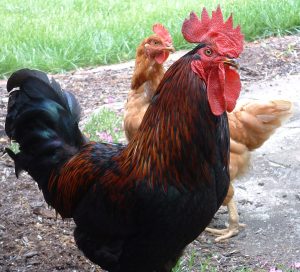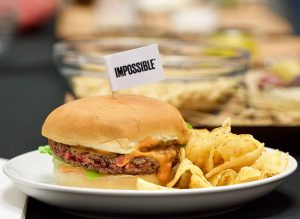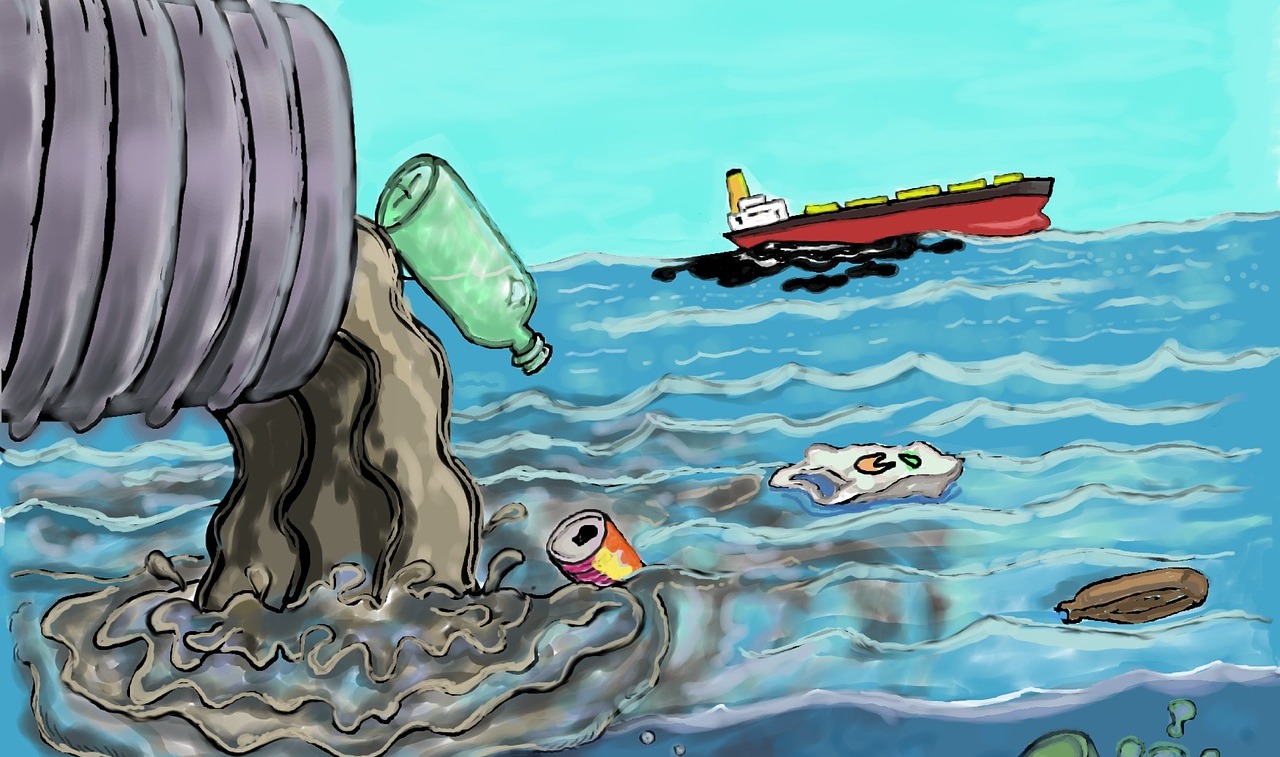Addressing World Hunger, Environmental Degradation, Human Health, and Animal Welfare, All at Once
The United Nation’s Sustainable Development Goals are both compelling and important. As someone who has been working on eliminating global poverty since high school – including six years running a homeless shelter in inner-city Washington, D.C. – the SDG2, in particular, stands out to me: ending hunger and food insecurity. Little else matters to an individual who is hungry or doesn’t know when their family’s next meal will be.
Yet we continue to do many things that make it difficult to end hunger and ensure food security for our ever-expanding global human family.
For example, in the early 2000s, according to a World Bank report, biofuel production drove global food prices up 75 percent, dwarfing the effect of weather changes, drought, and other factors. The impact was so severe that Jean Ziegler, the U.N. Special Rapporteur on food policy, called the diversion of crops to biofuels “a crime against humanity.”
This seems like a fair judgment. Given the amount of hunger and poverty in the world, using crops to make biofuel – and thus depriving people of food while driving up the price of the remaining harvest – could well be considered a crime against humanity. But the extent to which we convert crops into biofuels pales in comparison to the amount of crops we feed to chickens, pigs, turkeys, and other animals. If we are going to be concerned about wasted crops for biofuels, shouldn’t we be even more concerned with this much larger diversion of food to animals?
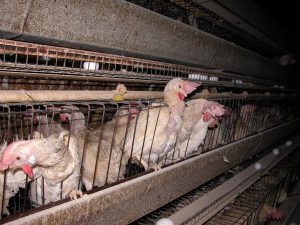
IN THE PHOTO: Egg-laying hens. CREDIT: Compassion over Killing
It is natural to think that feeding global crops to animals is not a problem because we then eat the animals. But the vast majority of calories and protein we feed to farmed animals doesn’t get converted into edible meat. Instead, it is used by the animal as it grows its entire body – including bones, feathers, and organs – to slaughter weight.
For example, to get one calorie of chicken meat, we have to feed the chicken nine calories of crops. That’s 800 percent food waste. It’s as if we had nine plates of food ready to serve our growing population, but instead, we just throw away eight of them.
Just as with biofuel production, feeding crops to animals is worse than just wasteful. Yes, by eating meat, we lose at least eight out of every nine calories we grow. But by not feeding these crops directly to people, we drive up the cost of the remaining crops even further, exacerbating malnutrition and starvation around the world. It was this impact on the cost of grains – and thus global malnutrition and starvation – that lead U.N. Rapporteur Ziegler to call biofuels a ‘crime against humanity’, and it’s also why we should be at least as concerned with the practice of feeding crops to animals.
IN THE PHOTO: Chicken. CREDIT: Matt Ball
This inherent inefficiency also leads us to overuse many other limited resources. If we are growing nine times more calories than we are actually consuming, we are using nine times more land, nine times more water, nine times more fertilizer, and nine times more pesticides and herbicides. We’re using nine times more fossil fuels to plant, harvest, and ship all these extra crops. And then, we’re using more fossil fuels to run the factory farms, and still more to ship the animals to energy-intensive slaughterhouses.
It may not seem like it when looking at a crispy chicken sandwich, but there is no way around it: animal agriculture is a scourge on our planet. Research by UN scientists found that raising animals for food is one of the top contributions to every single one of the most severe environmental problems plaguing us: from water pollution, desertification and deforestation to biodiversity loss and climate change.
The climate impact of our current animal agricultural system is perhaps the most surprising. When we think about global warming, the first thing that usually comes to mind is our car: so the solution from an individual vantage point is to drive less or buy a hybrid car. But animal agriculture actually causes more climate change than every plane, train, and automobile in the world combined.

IN THE PHOTO: New wave popcorn shrimp. CREDIT: Eric Day
The problems of animal agriculture are obvious and overwhelming without even considering its impacts on human health. For example, tens of millions of Americans – and many more globally – suffer food poisoning from animal products every year.
Perhaps an even greater threat than any of those already discussed is the widespread use of antibiotics on filthy factory farms, which leads to more and more antibiotic-resistant superbugs. These superbugs could cost the world $100 trillion by 2050.
A review by UK government found that the threat to the human race from deadly new drug-resistant disease strains is “more certain” than the threat from climate change.
Given that the current system of meat production is unbelievably wasteful, destructive, poisonous and deadly, why do we put up with it? Why is animal agriculture growing in almost every single country in the world?
The answer is simple: people want to eat meat.
Luckily, today we have Tofurky deli slices. And Beyond Meat chicken strips. And Field Roast Sausages. And the Impossible Burger. Now we don’t have to poison the planet and ourselves to have meat. We have companies making meat – efficiently and cleanly – from plants.
Here is the story of one of those companies.
Back in 2009, Ethan Brown was working in clean energy because of his concern about climate change. When he learned about the impact of industrial animal agriculture, he started wondering: what is meat, really? He realized that meat is simply a combination of lipids, amino acids, minerals, and water. So rather than convincing everyone that they should think more about the climate impact of meat, Ethan decided to create climate-friendly meat from plants.
Plant-based meat.
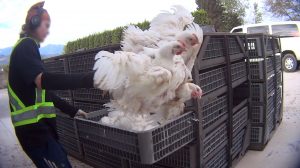
IN THE PHOTO: Birds raised for meat (broilers) trying to escape from the bins they’re transported in. PHOTO CREDIT: Mercy for Animals
Ethan founded Beyond Meat to test his hypothesis. He found investors and hired food scientists, plant biologists, chefs and other culinary experts. Three years later, he and his team proved it is possible to make meat from plants.
When Bill Gates, who is now an investor in Beyond Meat, tried Ethan’s chicken strips, he said he couldn’t tell the difference. Gates declared: “What I was experiencing was more than a clever meat substitute. It was a taste of the future of food.” One of the most famous foodies in North America – New York Times columnist and cookbook author Mark Bittman – very famously agreed.
In 2016, Ethan’s team created their next masterpiece, the Beyond Burger, which is designed to cook up and taste exactly like a hamburger. The Beyond Burger is actually sold in the meat case at Kroger, Safeway, and more.
Virgin founder Richard Branson got on board as an evangelist: “I’ve had a lot of fun serving juicy hamburgers to everybody at the dinner table and watching their faces as they said: “This is the best hamburger I’ve ever eaten,’ only to be told it was all vegetarian.”
Even more telling is that Tyson Foods – by far the biggest meat producer in the US – was so excited about the Beyond Burger that they invested in Beyond Meat. Former McDonald’s CEO Don Thompson has also invested. That’s right: our country’s largest meat producer has invested in plant-based meat, as did the former CEO of McDonald’s!
Not only have the meat industry and Bill Gates seen the future, but so has the rest of Silicon Valley. Take Eric Schmidt, the former CEO of Google and now the Chair of the Board of Google’s parent company, Alphabet. Recently, Eric was asked to reflect on the top technological innovations he believes will improve life for humanity by an order of magnitude in the fairly near future. Given his tech background, of course, he talked about the kinds of things we would expect: 3-D printers; self-driving cars, watches that know we’re sick before we know we’re sick. But the first thing he talked about – the very first thing – was plant-based meat.
Eric focused on plant-based meat for its capacity to feed a growing global population and for doing it without having an adverse impact on our climate. He calls it “nerds over cattle.”
Still, there are some people who think plant-based meat won’t ever take over the entire market. Perhaps they had a bad encounter with a zucchini burger back in 1986; they really should try the Beyond Burger or the Impossible Burger, created by former Stanford biochemistry professor Pat Brown (no relation to Ethan). Professor Brown’s company – Impossible Foods – has netted investments from the richest person in Asia, Li Ka-shing, Facebook co-founder Dustin Moskovitz, Google Ventures, Bill Gates (again), and many more.
The Impossible burger is so good that it’s first public champion was David Chang, who about a decade ago removed all vegetarian entrées from the menus of all of his restaurants. If you can win over David Chang with plants, you can win over anyone.
IN THE PHOTO: The Impossible Burger. CREDIT: Eric Day
But for those holdouts who insist that their meat come from animals, other advances in food technology could save us from the myriad of harms to animal agriculture.
The most promising of these technologies – clean meat – has been a long time coming. All the way back in 1931, Winston Churchill said: “We shall escape the absurdity of growing a whole chicken in order to eat the breast or wing, by growing these parts separately under a suitable medium.”
Churchill’s vision is being brought to reality by Mayo-Clinic-trained cardiologist Uma Valeti. Back in 2005, Dr. Valeti was thinking about the process of reconstructing heart tissue and wondered: “Why couldn’t we do this with animal flesh and build meat using standard tissue engineering techniques?” In 2015, he launched Memphis Meats around the concept of growing meat directly from animal cells.
This type of meat is called ‘clean meat’ as a nod to clean energy. Clean meat, like clean energy, is produced with far less harm to the environment. Clean meat is also just physically cleaner because there is no slaughterhouse, so the meat has no bacterial contamination and no antibiotic or other drug residues.
Since Memphis Meats launched, the company has been driving down the cost of producing clean meat almost every month. Bill Gates and Richard Branson are investors, backing both sides of the coming transformation of the meat industry. So is venture capital kingmaker DFJ, an early investor in a bunch of wildly successful tech companies including Skype & Twitter.
And again, the meat industry sees the future, with major meat conglomerate Cargill, the largest private company in the United States, investing in Memphis Meats.
All these individuals and companies are wise to get into the game. Not only are the plant-based and clean meat market sectors going to be incredibly lucrative, but they will also save humanity from the threats created by our current system of animal agriculture.
Given these threats, humanity shouldn’t be dependent on Silicon Valley and the private sector.
A few years back, Chatham House – the most widely cited think tank in Europe – declared that governments will be unsuccessful in holding climate change to less than 2 degrees Celsius by 2050 unless their populations consume less meat. Chatham House’s solution was that governments should educate their populations and encourage meat reduction.
The Chinese government has done just that, pledging to cut its per capita meat consumption in half by 2030, using the power of persuasion and the fact of potential climate catastrophe.
While I admire the optimism of Chatham House and the Chinese in their belief that human beings will prioritize climate when making their food choices if only they have the information, I think that our friends at Beyond Meat, Impossible Foods, and Memphis Meats have a better solution – simply make products that compete with animal-based meat on the basis of the factors that dictate consumer choice: price, taste, and convenience.

IN THE PHOTO: Meatball. CREDIT: Memphis Meats
Make the products that consumers buy better for food security, the environment, human health, and so on. Reimagine meat.
Governments should back the development of plant-based and clean meat, given that these technologies are the clear solutions to huge and imperative global problems. The US government currently puts $3 billion a year into agricultural research. China puts in even more. Imagine if governments used these resources to form plant-based meat and clean meat research centres at universities like MIT, Stanford and other major universities and research centres around the world.
We face many global threats today, but one powerful and simple solution is staring us right in the face: plant-based and clean meat. It’s time for the governments of the world to get on board and help improve the future for current and future generations.
Editors note: The opinions expressed here by Impakter.com columnists are their own, not those of Impakter.com
FEATURED PHOTO: Duck A l’Orange. CREDIT: Memphis Meats



